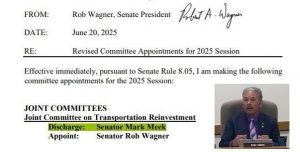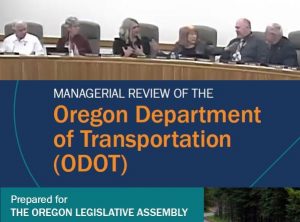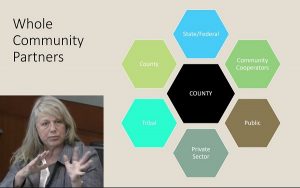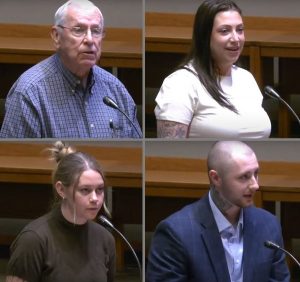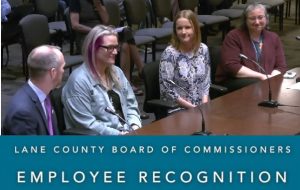Legislature supports community organizations active in disasters
5 min read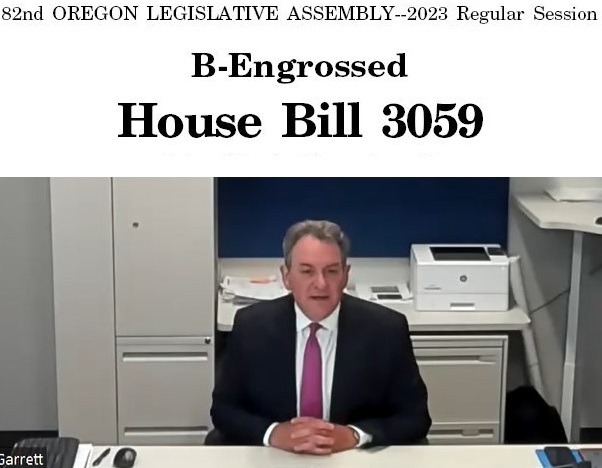
It was a good legislative session for the Oregon Department of Emergency Management. The legislature bundled many of the new department’s requests into HB 3059.
[00:00:12] Matt Garrett (interim director): There were a lot of bills introduced and over the course of the legislative conversation, a lot of those concepts that were embedded in the various bills actually made their way to what I will term an omnibus emergency management bill, House Bill 3059. Not an uncommon pathway, to see bills migrate into bigger bills.
[00:00:34] And so you’ll see a lot of those initiatives really made their way into that bill and that bill passed both chambers and actually is currently on its way to the governor for signature.
[00:00:44] So you’ll see issues with regard to: a disaster response matching fund, again, making sure that there’s monies available to match that those federal dollars specifically from our local partners to make sure we’re again, maximizing the opportunities there; positions and the establishment of a Compliance Division actually to make sure, again, the oversight, the monitoring, the compliance of those federal grants, the role, that the obligations that we have as an agency and then the subrecipients or those folks that receive the grants, we’re dotting our i’s and crossing our t’s, making sure we’re doing what we need to do to meet all the requirements that come with that.
[00:01:27] There is also direction with regard to technical assistance this agency is to give to our local emergency management partners as well as those community-based organizations or the community organizations that are active in disasters (COADs). So again, another effort to identify courses of action that make a little more robust the emergency management enterprise or ecosystem that we have here in the state of Oregon.
[00:01:54] And then there were a couple issues that dealt with volunteers, expanding it beyond just the professionals at Red Cross volunteers, but all volunteers that are doing disaster relief, those public agency or public servants that are doing disaster relief, disaster response agencies, making sure they can potentially be compensated if they choose to engage in an activity. And then there’s a study related to volunteerism as well.
[00:02:20] So, again, a lot of those bills made their way into that big House Bill 3059.
[00:02:25] During this session, this agency really focused on budgetary-type issues because we’re a fairly new agency, right? We were lifted out of the Military Department as a standalone agency in July of 2022. So with that, we were focused on organizational structures, positions, and making sure that we start to make this now standalone agency as robust as possible.
[00:02:51] Now, that probably is a multisession conversation.
[00:02:54] It is a journey. There’s no question about it. You want to surround yourself with good, capable, high-caliber individuals who deliver. So it’s an interesting journey. That will continue.
[00:03:05] But this specific legislative session was really focused with that budgetary intent here. And we do believe that the legislature showed confidence in the Department of Emergency Management. Now, our responsibility is to repay that confidence by delivering on those initiatives, those programs that were embedded there because we do believe we have future conversations to ensure that structurally we are in a place to ensure the effectiveness and the efficiency in meeting the mission of the department here.
[00:03:38] So longer conversation, but coming out of the ‘23 legislative session was a positive step forward, but a step in a journey.
[00:03:46] John Q: Any future initiatives for the department?
[00:03:49] Matt Garrett (interim director): There were a couple of initiatives that were spoken to, but didn’t make it through the process that, I think we’ll continue some discussions. The opportunity to have dialogue about a statewide individual assistance program and public assistance program to mirror what’s on the federal side, the FEMA programs here. There are those, obviously, there are those events like the 2020 Labor Day wildfires that reach thresholds, the severity of scope, reach thresholds that bring in the FEMA money.
[00:04:25] But there are also disasters that play themselves that don’t reach those thresholds. But there’s not a mechanism to help those folks impacted by those type of disasters here. And I think about the Bootleg Fire down in Klamath / Lake County. Again, facilities compromised, individuals impacted by the fire, but there wasn’t a vehicle to help them.
[00:04:51] Well, here’s an opportunity for those, if they don’t clear a threshold, might we have something in the state to help folks? A pot of money. I think that is an investment that will have benefit long-term for Oregonians because I think the realities are that given climate crisis, just given where we are, natural disasters are going to occur.
[00:05:11] How do we position ourselves from a preparedness side all the way through the arc of recovery? And these two, these type programs I think allow us to take it to the advantage of folks who have been impacted, but there’s no access to some of the federal dollars here. So I think those are future conversations that play themselves out.
[00:05:31] I think there are future conversations of augmenting and making a little more robust certain programs that, by incident response equipment, pre-positioning those around the state, again, a preparatory and a response-type function that again, eventually bleeds into the recovery-type activities.
[00:05:50] Those are just, I think, good, smart, prudent decisions in terms of how this state prepares to mitigate, whether it’s a natural or a human-made disaster. So those are legitimate policy conversations that I think should continue.
[00:06:08] As well, we want to make sure that we are, as an organization, positioned well with the individuals and the resources to deliver on the initiatives and the programs, especially in times of need when there’s a crisis here in the state of Oregon.
[00:06:22] John Q: He had officially retired from the state once, but was called back to serve. He’ll try to retire again this summer.
[00:06:30] Matt Garrett: I had the privilege of being with the Department of Transportation and then a little time off, but then, unfortunately, Mother Nature hit us with the 2020 Labor Day wildfires. And then Gov. (Kate) Brown asked me to come back and then Gov. (Tina) Kotek asked me to stay on while she does a thorough and comprehensive search for the next director of the Department of Emergency Management.
[00:06:54] Now my tour of duty probably is going to end in August. We’re in the initial stages of interviews right now, and it looks like an August timeframe for the governor to make a selection.
[00:07:04] John Q: $1 million to support matching grants, $1 million for compliance, and about a quarter million for community organizations, as the new department builds capacity and starts interviewing for its next director.
